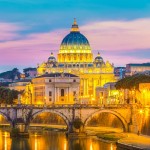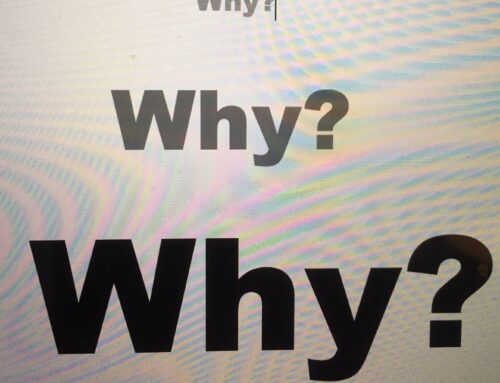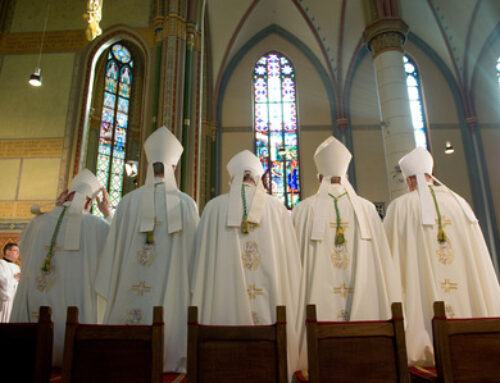 Catholics old enough to remember how different the Church was fifty or so years ago often wonder what happened to change it. The most common answer is the Second Vatican Council happened. But that answer raises more questions: What happened at that Council? What changed as a result? And were those changes theologically and/or philosophically justified?
Catholics old enough to remember how different the Church was fifty or so years ago often wonder what happened to change it. The most common answer is the Second Vatican Council happened. But that answer raises more questions: What happened at that Council? What changed as a result? And were those changes theologically and/or philosophically justified?
To answer these questions fully would require much more space than is available here. But a brief overview will be helpful. First, some historical background.
Traditional Catholic philosophy posits that humans are composed of physical bodies and non-material souls, the latter consisting of intellect and will; also, that humans are imperfect and therefore capable of evil as well as good and foolishness as well as wisdom. The secular world offered a different view, of course, especially over the last several centuries when the Enlightenment spawned Positivism, which overemphasized intellect, and Romanticism, which overemphasized emotion.
Positivism eventually led to Social Darwinism, which rejected the idea of a higher spiritual nature, as did the then-new field of psychology—notably Freudianism, which disparaged intellect, and Behaviorism, which denied both intellect and will.
In the early twentieth century, philosophy largely abandoned ethics, metaphysics, and epistemology and ceded intellectual leadership to psychology. By mid-century, the most publicized school of philosophy was Existentialism. Although this new philosophy had some Christian forms, for the most part it was agnostic or atheistic. Among its central premises were that existence is absurd and therefore unknowable by the intellect, and that metaphysical being and the afterlife are delusions.
Thus, in mid-20th century both psychology and philosophy were aligned against the Catholic intellectual tradition. But then there arose a new school of psychology that rejected the prevailing psychological negativism, as well as the depressing perspective of Existentialism. Even its name—Humanistic Psychology (HP)—suggested support for the religious view of humanity.
In reality, however, HP represented the other side of Enlightenment thought, Romanticism, which was no less inimical to traditional religion than was Positivism. But many religious people regarded HP as a deliverance from their enemies rather than an old enemy in a new disguise. (In 1962 after speaking to a group of Catholics, Abraham Maslow wrote in his journal, “They shouldn’t applaud me—they should attack. If they were fully aware of what I was doing, they would.”)
At the very time when Humanistic Psychology was beginning its dramatic ascendance to dominance in western culture, Pope John XXIII convened a major gathering of Catholic leaders, the Second Vatican Council (SVC), with the famous phrase, “Throw open the windows of the church and let the fresh air of the spirit blow through.”
What actually entered the windows, however, was Humanistic Psychology, together with Liberation Theology (LT), a older movement that shared its basic premises. Long before becoming pope, Benedict XVI argued that LT diminished the importance of faith, elevated the role of science in social matters, and transformed Christian theology into an instrument for “progressive” political action that amounted to a “radical . . . reinterpretation” of the Christian faith. (Incidentally, unlike Humanistic Psychology, LT was not imported from outside the Church—it was, in Malachi Martin’s words, a “Jesuit creation.”)
To be more specific, the ideas that entered the windows of SVC included the following:
Everyone is born wise and good; where evil exists, it is caused by the agencies of society. (This idea contradicts the traditional doctrine of original sin, as well as the belief that people are responsible for their own actions. It also encourages replacing the ideal of justice with “social justice” and the related idea of “redistributing wealth.”)
People create their own truth and reality; they are their own authorities and have no need of others. (This idea denies objective truth, moral law, and the need for spiritual guidance by any other person or agency, including the Church.)
Feelings are as trustworthy a guide to behavior as reason. (This idea challenges the Catholic philosophical tradition, which emphasizes the role of careful thought and judgment in responsible behavior. For example, this idea renders the traditional requirements for mortal sin—“serious matter, sufficient reflection, full consent of the will”—virtually meaningless.)
All forms of sexual expression are natural and wholesome. (This idea, emphasized in HP, was buttressed by the supposedly scientific but eventually discredited findings of Albert Kinsey. It opposes virtually every traditional Catholic teaching on sexuality.)
Nowhere was the influence of HP (and LT) greater than in the religious order that had been among the most committed to defending the Catholic faith—the Society of Jesus, better known as the Jesuits. According to Jesuit historian Father Joseph Becker, even as Vatican II was unfolding, “novice directors began attending psycho-religious institutes, sensitivity sessions, and similar activities of humanistic psychology. Also, the novice library began to include some of the popular works in the field.” One important lesson in these experiences was that “the truth of theology was to be found in its meaning to the self.”
Thus, although SVC was intended to renew traditional Catholic teaching, for many, including some in the hierarchy, it served to replace that teaching with an opposing one. For those individuals, as Michael Novak noted,
To be a Catholic now meant to believe more or less anything one wished to believe, or at least in the sense in which one personally interpreted it. One could be a Catholic ‘in spirit’. One could take Catholic to mean the ‘culture’ in which one was born, rather than to mean a creed making objective and rigorous demands. One could imagine Rome as a distant and irrelevant anachronism, embarrassment, even adversary.
In other words, the ideas that entered through the windows of Vatican II made it possible for Catholics to reject every teaching that has been part of the Catholic tradition and still consider themselves Catholic.
The foregoing facts explain why pronouncements on social justice, immigration, or other moral issues from the U. S. Conference of Catholic Bishops or in some cases from Rome frequently make older Catholics scratch their heads in puzzlement. They realize that what was considered theological ignorance or even heresy half a century ago is now, in some cases, considered spiritual insight! The traditional prescription “Thou shalt not” has become the fashionable “Whatever.”
Can this situation be changed? Yes, but only if (to borrow John XXIII’s metaphor) the Church “throws open its windows” once again and clears the air of much that has blown in! This task is formidable for two reasons. First, it requires discernment. Many of the traditional ideas that were replaced did not deserve to be, whereas others did, so each idea must be judged on its merits.
Secondly, the people who have the authority to carry out the task—the Catholic hierarchy—are in many cases ill prepared and/or indisposed to do so. This assertion sounds harsh, and perhaps even insulting. I intend it to be neither, but instead a simple statement of a most unfortunate fact.
By ill-prepared, I mean that, though the hierarchy may have received advanced training in moral theology (and not all have), they often are untrained in other fields that are increasingly relevant in matters of moral judgment. For example, economics, sociology, and comparative government in issues such as poverty and “social justice. By indisposed, I mean that, like many others who have embraced the precepts of Humanistic Psychology and Liberation Theology, they are often out of touch with, and even dismissive of, pre-Second Vatican Council teachings and those who hold them.
This indisposition is intensified by an assumption common among people in authority: “I am above other people in station, so my thought processes and opinions are superior to theirs and there is no point in considering what they have to say.” This assumption is especially prominent among ecclesiastical authorities both because they are considered anointed by God Himself and because for millennia the laity were largely uneducated, often woefully so.
That assumption is, of course, mistaken. All people are capable of error irrespective of their power and prestige; God reserves the right to give spiritual insights to whomever He chooses, including those of low station; and the educational advantage enjoyed by the clergy for millennia no longer exists. Today, many laypeople surpass their clerical counterparts in education and expertise, even in areas such as moral theology.
My prayer is that the Catholic hierarchy will have the courage and humility to put aside assumptions, preconceptions, and intellectual biases and lead the Church in a serious reassessment of its teachings, one to which everyone who loves truth is invited and guaranteed a respectful hearing.
Copyright © 2014 by Vincent Ryan Ruggiero. All rights reserved



